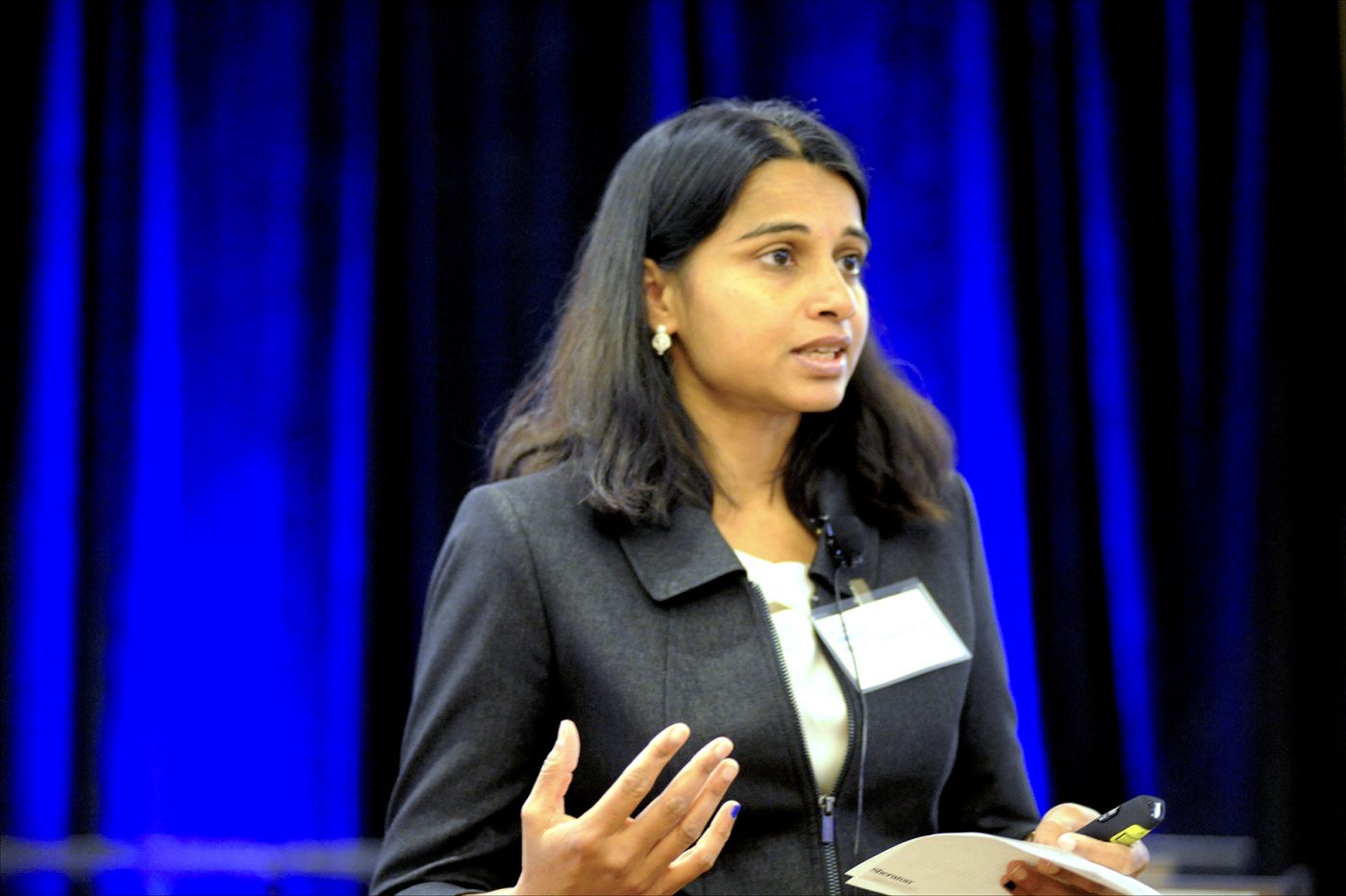Neurologist Urges Greater Focus on Brain Issues in Duchenne

Mathula Thangarajh, MD, is a neurologist who specializes in Duchenne. (Photo by Larry Luxner)
Close to 85 percent of boys and young men with Duchenne muscular dystrophy have never seen a mental health professional, says a leading neurologist based in Washington, D.C.
Mathula Thangarajh, MD, of Children’s National Medical Center, gave a talk, “Behavior and the Brain in Duchenne,” at the recent Futures conference in Needham, Massachusetts. About 100 people attended the event, which was sponsored by the nonprofit organization CureDuchenne.
“We have done fantastically when it comes to muscle health, cardiac health, and how to look after your lungs. But we’ve really not done a good job when it comes to brain health,” she said.
“When I finished my training five years ago, we never saw boys with Duchenne advocate for themselves. The community has really changed this,” she added. “And that’s why it’s very important to understand that the brain is an organ that’s affected in Duchenne. Learning to tend to your brain health is very important, right from infancy.”
Thangarajh said that the French neurologist who discovered the disease, Guillaume-Benjamin-Amand Duchenne de Boulogne, studied 12 boys with progressive muscular weakness.
The Muscular Atrophy News forums are a place to connect with other patients, share tips and talk about the latest research. Check them out today!
“In his first-ever description of the disease, he noted that one of the boys had speech development delays,” she said. “Despite the fact that he described these things more than 150 years ago, it doesn’t get as much consideration as it should.”
Learning difficulties, speech delays
Thangarajh’s article, “Neurodevelopmental Needs in Young Boys with Duchenne Muscular Dystrophy: Observations from the Cooperative International Neuromuscular Research Group DMD Natural History Study,” appeared in PLoS Currents.
“We asked parents what they were most concerned about. Uniformly, they said learning difficulties and speech problems,” she said. “That means all the burdens have shifted to the parent. Some of these children cannot participate in clinical trials, and that’s unfair. When it comes to the real world, you want to know how your medicine works on brain health.”
Thangarajh’s study evaluated 204 Duchenne patients ages 4 to 8 as part of a much larger longitudinal international Duchenne natural history study. The study included boys from North America, Europe, Israel, Australia, and India. Their mean age was 6.4 years, and 72.6% were Caucasian, with the remaining 17.7% identifying as Asian, 3.5% as “other,” 1% as Pacific islander, and 0.5% as black.
Her team found that the most commonly reported neurodevelopmental problems were speech delay (33%); mild developmental delay (24%); significant behavioral issues (16.5%); language impairment (14.5%); learning disability (14.5%); attention-deficit hyperactivity disorder, or ADHD (5%), and autism spectrum disorder (3%).
In addition, these issues were more common among Duchenne boys with mutations downstream of exon 51. Notably, the researchers wrote in the introduction of the study, “not only do individuals with mutations between DMD exons 45-50 have lower intellectual capacity and impaired information processing compared to individuals with DMD mutations in exons 1-44, they also have smaller total brain volume and gray matter volume.”
The study also found no correlation between neurodevelopmental issues and use of steroids.
“We certainly hear from families that behavior is a big issue with kids on steroids. Some data suggests that neurons are affected by long-term steroid use,” she said, noting that autism is four times more common in Duchenne than in any other disease.
Long wait times for specialists
“By the third month after a baby is formed, the brain cells go variable. Even from the time of birth, lots of remodeling going on,” she said. “Neurons have to talk to each other. In order to get that feedback, dystrophin is extremely important. Neurons are developing right from the time of the embryo. We don’t think of this as static, but very dynamic.”
Thangarajh added: “Even during adulthood, there’s a lot of remodeling going on. As you grow older, it’s not the neurons here that cause the degeneration. There’s a shift away from that. When we see families with Duchenne, we see a spectrum. Some families struggle more with behavioral issues, others with compulsive-obsessive anxiety.”
This is why a neurological assessment is important — and why access to both psychologists and speech therapists are critical for young Duchenne patients.
“One of the constraints we have is the scarcity of neuropsychologists,” she said. “Even in a big metropolitan city like Washington, D.C., the average wait time to see one is six to nine months. And it’s a little challenging for a 4- or 5-year-old kid to have an IQ test.”
The neurologist thanked CureDuchenne for organizing the conference and praised young patients like 15-year-old Jake Mazzarro and 21-year-old Hawken Miller, both of whom spoke publicly at the Futures conference about what it’s like to live with Duchenne.
“It’s not very often I get to do advocacy work, which I’m very passionate about. It really takes a lot of courage to stand in front of people and talk about your struggle,” Thangarajh said. “That gives meaning to what I do every day.”






